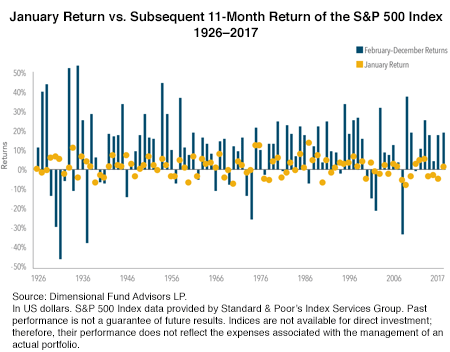As the year begins, the pundits and talking heads are out in full swing with their predictions for 2018. But can anyone really predict the future consistently and predictably? Much of what investors see in the financial media is just noise. Some of that noise appears to be based on fundamentals but when one digs deeper, this is rarely the case.
For example some of the more popular headlines are about the “January Indicator” or “January Barometer.”
This theory suggests that the price movement of the S&P 500 during the month of January may signal whether that index will rise or fall during the remainder of the year. In other words, if the return of the S&P 500 in January is negative, this would supposedly foreshadow a fall for the stock market for the remainder of the year, and vice versa if returns in January are positive.
So have past Januarys’ S&P 500 returns been a reliable indicator for what the rest of the year has in store? If returns in January are negative, should investors sell stocks? The chart below shows the monthly returns of the S&P 500 Index for each January since 1926, compared to the subsequent 11-month return (i.e., the return from February through December). A negative return in January was followed by a positive 11-month return about 60% of the time, with an average return during those 11 months of around 7%.
This data suggests there may be an opportunity cost for abandoning equity markets after a disappointing January. Take 2016, for example: The return of the S&P 500 during the first two weeks was the worst on record for that period, at -7.93%. Even with positive returns toward the end of the month, the S&P 500 returned -4.96% in January 2016, the ninth-worst January return observed from 1926 to 2017. But a subsequent rebound of 18% from February to December resulted in a total calendar year return of almost 13%. An investor reacting to January’s performance by selling out of stocks would have missed out on the gains experienced by investors who stuck with equities for the whole year. This is a good example of the potential negative outcomes that can result from following investment recommendations based on an “indicator.”

Conclusion
Over the long term, the financial markets have rewarded investors. People expect a positive return on the capital they supply, and historically, the equity and bond markets have provided meaningful growth of wealth. As investors prepare for 2018 and what the year may bring, we should remember that frequent changes to an investment strategy can hurt performance. Rather than trying to beat the market based on hunches, headlines, or indicators, investors who remain disciplined can let markets work for them over time. At JJ Burns & Company, we adhere to a disciplined investment strategy focused on broad global diversification, asset allocation, rebalancing, dollar cost averaging and managing costs.
Indices are not available for direct investment. Their performance does not reflect the expenses associated with the management of an actual portfolio. Past performance is not a guarantee of future results. Diversification does not eliminate the risk of market loss.
There is no guarantee investment strategies will be successful. Investing involves risks including possible loss of principal. Investors should talk to their financial advisor prior to making any investment decision. There is always the risk that an investor may lose money. A long-term investment approach cannot guarantee a profit.
All expressions of opinion are subject to change. This article is distributed for informational purposes, and it is not to be construed as an offer, solicitation, recommendation, or endorsement of any particular security, products, or services. Investors should talk to their financial advisor prior to making any investment decision.
investing investments stock market




